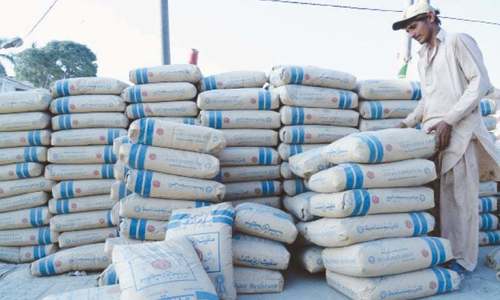LAHORE: Pakistan’s cement producers plan to expand their capacity by more than 40 per cent from nearly 69 million tonnes to nearly 99m tonnes over the next several years in anticipation of 10-15pc growth in their sales every year, claims an All Pakistan Cement Manufacturers Association (APCMA) official.
Speaking with Dawn, the APCMA official, who requested anonymity, said almost every cement manufacturer had planned to increase their production capacity through greenfield and brownfield projects. Many projects, especially the brownfield ones, are expected to come on line in the next two years, adding nearly 18m tonnes to the existing capacity.
“Almost 95pc of the new capacity is being planned in the north – mostly in Punjab – where the most growth in demand is coming,” he said.
According to him, the industry was of the view that cement sales will spike as construction activity picks up further going forward on the back of a generous housing package announced last year by the prime minister to help the economy to recover from the Covid-19 pandemic impact. The announcement of mega infrastructure schemes and resumption of work on CPEC related projects and dams too are driving the industry sentiment.
The massive reduction of 625bps in the central bank’s policy rate from 13.25pc to 7pc during March and June last year to offset the impact of the Covid-19 pandemic as well as the availability of cheaper long-term financing for new and old projects under the Temporary Economic Refinance Facility (TERF) initiative, which has diluted the borrowing cost of the industry across different sectors, have also contributed to the cement producers’ decision to undertake expansions.
Most cement makers have already disclosed their expansion plans through bourse filings over the last few months.
The new investments represent the fourth expansion cycle by the cement industry.
Cement dispatches have consistently been rising since the resumption of economic activities last summer ever since the Covid-19 curbs on the construction industry, and other businesses, were lifted. Total cement dispatches – domestic and exports both – jumped 19pc to 48.3m tonnes during the period between July and April from 40.5m tonnes a year ago. Domestic sales are up by almost 19pc to 40.2m tonnes and exports by about 20pc to 8m tonnes.
There has been a visible improvement in the top and bottom lines of the cement companies even if the firms located in the north of the country are still selling their product at lower retail price compared with the ones in the south — Sindh and Balochistan.
The profits after tax of the listed companies grew to Rs35bn during the first three quarters of the present fiscal year to March from a loss of Rs8bn last year as industry sales spiked 37pc to Rs264.3bn.
During the third quarter the industry profits rose to Rs18.4bn, or more than half or the total profits during nine months of the current fiscal year.
The industry, which suffered a cumulative loss of Rs13bn – including the Covid-19 related loss of Rs4.7bn – last fiscal year owing to the addition of 1.5m tonnes in new capacity and shrinking demand has seen its profitability return as the retention prices increase and sales spike. The higher profitability is attributed to a 26pc decrease in the finance cost of the producers to Rs9.9bn owing to a hefty reduction in the interest rate as well as a government decision to slash excise duty on cement by Rs25 a bag to Rs75 in the budget.
The uptick in the cement dispatches is being showcased by the government as a major sign of an economic turnaround in the country following a crushing slowdown during the last two years under the Pakistan Tehreek-i-Insaf.
The industry, which has grown at an average rate of 7-8pc in the last 20 years, expects the incremental future demand alone to grow by 4-6mn tonnes that will require 2-3 new plants every year. A 5pc growth will need at least one new plant every year.
The new expansion cycle is billed to be different from the previous ones because of a higher base of demand. The industry expects the capacity utilisation rate to not fall below 70pc in this expansion cycle unlike 2008-09 when the producers increased their capacity from 18m tonnes to 42m tonnes, which resulted in excess supply because of a very low base of demand.
Maple Leaf Cement Factory director Waleed Saigol told Dawn from London that strong cement demand is driving the new expansion cycle in the industry although he was not sure if all the planned greenfield projects will actually be undertaken because of the higher costs and longer completion time.
Published in Dawn, May 9th, 2021
















































Dear visitor, the comments section is undergoing an overhaul and will return soon.